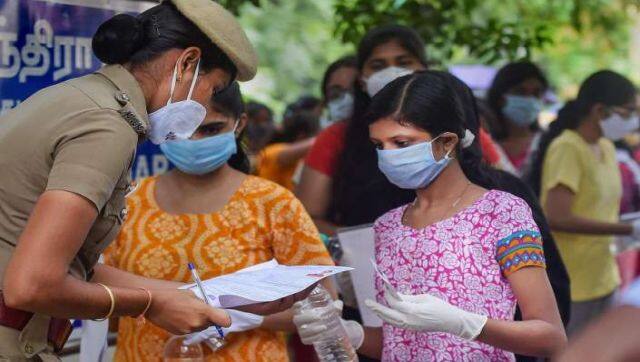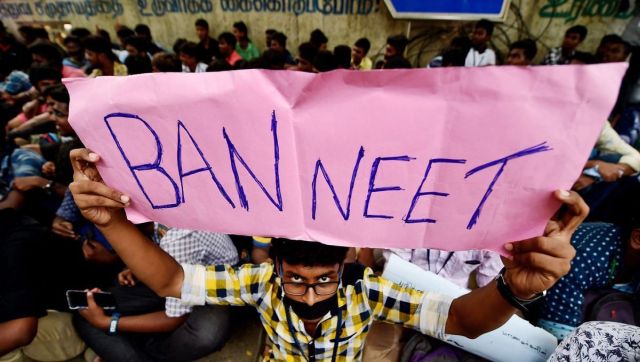The Tamil Nadu Assembly bill seeking an exemption to the state from the ambit of the National Entrance-cum-Eligibility Test (NEET) has been sent to the Centre for presidential assent by Governor RN Ravi. “As part of our struggle for NEET exemption, in the next step, we should jointly take all efforts to insist the Centre for presidential assent for the bill,” Tamil Nadu chief minister MK Stalin told the state Assembly on Wednesday.
#TamilNadu Governor R. N. Ravi has referred state-specific anti-NEET bill to the Centre for Presidential assent
— All India Radio News (@airnewsalerts) May 4, 2022
Cm M. K. Stalin makes an announcement in State Assembly, saying, the Secretary to Governor has informed over phone that he has sent the bill to Union Home Ministry.
What is the NEET Exemption Bill? NEET is the common qualifying test for MBBS and BDS programmes in medical and dental colleges across India. It is conducted by the National Testing Agency. However, the Tamil Nadu government wants students from the region to be exempted from the examination. The state has suggested that students can be admitted to medical colleges based on their Class 12 scores. The government passed the NEET Exemption Bill for the second time in February after the Governor had returned it last year. The bill was first passed in September 2021 to dispense NEET. Stalin had introduced the bill based on a recommendation of the high-level committee led by retired judge AK Rajan, which submitted a 165-page report in July last year. The retired Madras high court judge had said the report was prepared after looking into around 86,000 representations from various stakeholders, a majority of whom said they don’t want NEET, reports The Indian Express. According to the committee report, fewer kids from poor families made it to medical colleges after NEET was introduced. It also found out that the syllabus of the entrance test is skewed towards the CBSE syllabus and hence a disadvantage for students attending government schools. They are also unable to join coaching centres for NEET because of financial problems. [caption id=“attachment_10637161” align=“alignnone” width=“640”]  The anti-NEET bill was introduced in the Tamil Nadu Assembly after a 19-year-old medical aspirant died by suicide before the exam. PTI[/caption] Why is the TN government against NEET? According to the Tamil Nadu government, the NEET Exemption Bill will “ensure social justice and protect all vulnerable student communities from being discriminated against admission to medical education programmes”. The bill exempts medical aspirants in the state from taking NEET for admission to courses in medicine, dentistry, and homoeopathy. It seeks to bring vulnerable student communities to the “mainstream of medical and dental education and in turn ensure a robust public health care across the state, particularly the rural areas”. The Tamil Nadu government believes NEET undermines “the diverse societal representation in MBBS and higher medical studies, favouring mainly the affordable and affluent sections of the society and thwarting the dreams of underprivileged social groups”. The anti-NEET bill was first introduced in the Tamil Nadu Assembly after a 19-year-old medical aspirant died by suicide at his home in Salem last September, hours before the NEET exam. Promising a bill to exempt the state from the test, Stalin had said then that the aspirant died by suicide, as he was dejected that he could not clear the exam despite appearing twice earlier. The politics of the bill During election campaigns, the Dravida Munnetra Kazhagam (DMK) had promised that it would work toward NEET exemption for students in the state. After the party came to power, it set up a survey and the report said that the DMK government can take legal action to cancel the exam. A separate law can be enacted to repeal the NEET. However, the President of India’s approval is required, reports News18.com. The first bill which was sent to Governor RN Ravi was returned to the Tamil Nadu government. The governor and the ruling DMK have had frequent run-ins in the past. The party had in April boycotted a function at Raj Bhawan alleging a delay on Ravi’s part in giving assent to at least 11 bills passed by the state Assembly, including the anti-NEET Bill. Now the governor has reportedly referred the bill to the Centre for President Ram Nath Kovind’s nod, ending a three-month-long impasse with the Tamil Nadu government. What happens after the presdient’s approval? If the bill is approved by the President and passed by the Centre, the national-level exam would not be the only way to get admission to medical colleges. Like in the case of engineering, states could hold state-level entrance exams or consider Class 12 results for admissions. The Centre and NEET Efforts are being made to bring about changes to NEET. The National Medical Commission has removed the fixed upper age limit for those appearing in the NEET-UG examination. The Centre is also contemplating holding NEET twice a year. With inputs from agencies Read all the Latest News , Trending News , Cricket News , Bollywood News , India News and Entertainment News here. Follow us on Facebook, Twitter and Instagram.


)
)
)
)
)
)
)
)
)



